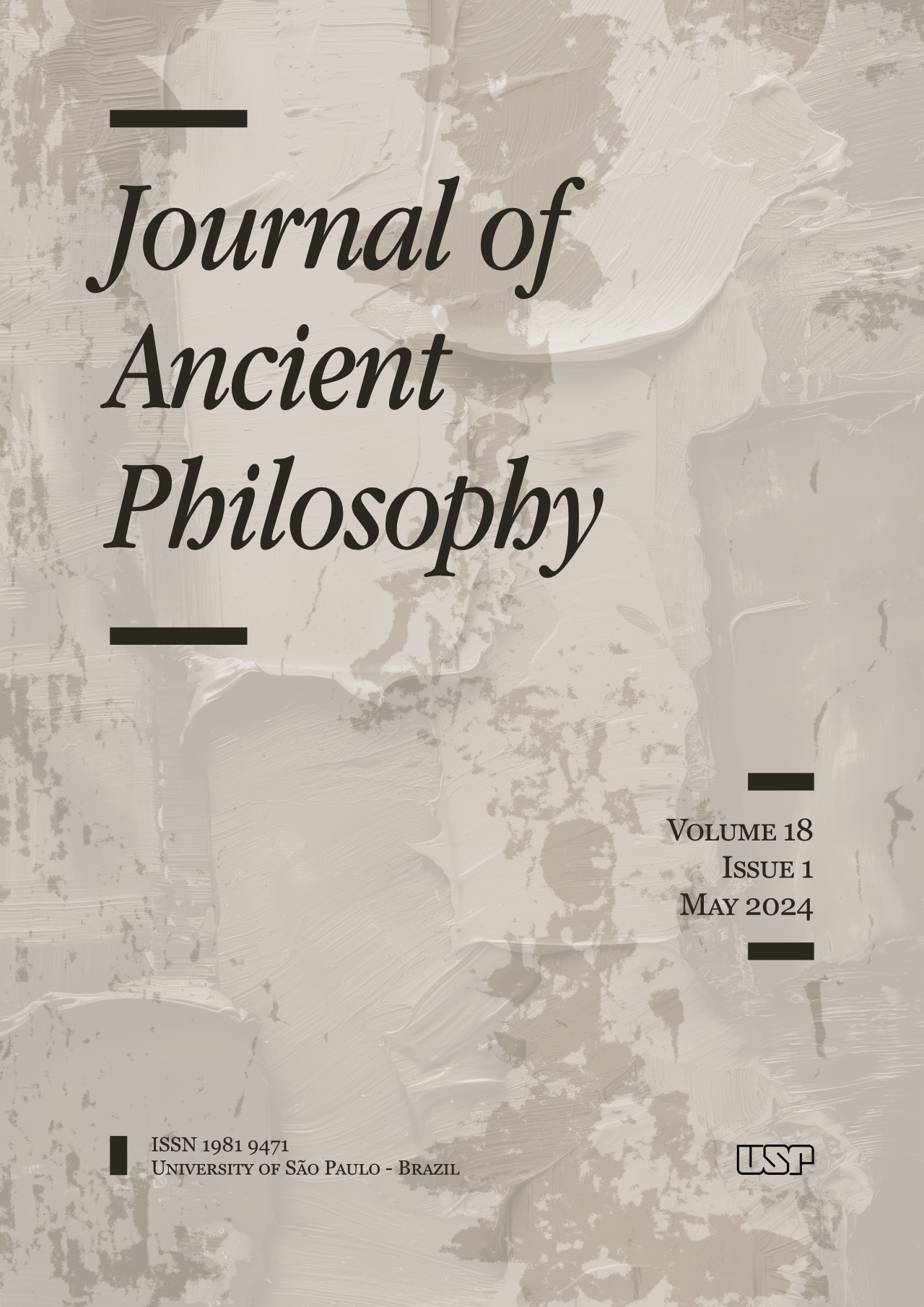The Appeal to Nature in Cicero's De finibus
DOI:
https://doi.org/10.11606/issn.1981-9471.v18i1p103-123Keywords:
Cicero, De finibus, cradle argumentAbstract
When Cicero examines the varied versions of cradle arguments that appear in De finibus, he finds much to criticize. Though he rejects these attempts to discern our proper ethical ends from the earliest inclinations of newborn animals, he nevertheless accepts that human beings should adopt ends for themselves that are consistent with, and perfections of, human nature. I argue that Cicero uses two connected argumentative strategies to create an appeal to nature that overcomes some basic problems he has with the cradle arguments used in Epicureanism, Stoicism, and the Old Academy. The first strategy criticizes the different cradle arguments directly, by which Cicero establishes two negative criteria for any appeal to nature. These criteria indicate what to avoid in arguing for a highest moral end or summum bonum. These criteria eliminate the Epicurean and Stoic cradle arguments, and more subtly criticizes the Antiochian one. As a result, it may seem plausible that Cicero either adopts the Antiochian position himself or that he at least considers it to be a strong position that is worthy of further consideration, particularly in contrast with his categorical rejection of the other schools. Cicero’s second strategy, however, leads us away from accepting any established cradle argument, including the Antiochian one. This strategy develops a rich theme of education over the course of the text and emphasizes an appeal to the telic sense of “nature” that ultimately meets the two criteria set out by his first strategy. He does not seek ethical direction in some biological origin and given nature as cradle arguments do. Cicero appeals instead to human nature and its summum bonum as it appears during philosophical education. Though he finds cradle arguments rely too much on given nature and too little on telic nature, Cicero’s own own emphasis on education and telic nature amounts to a new appeal to “nature” that, in avoiding the “cradle”, is more sound than those of his philosophical rivals.
Downloads
References
Annas, J. (1993). The Morality of Happiness. New York: Oxford University Press.
Annas, J. (2001), ed. On Moral Ends. R. Woolf trans. Cambridge: Cambridge University Press.
Annas, J. and Betegh, G. (2016), eds. Cicero’s De finibus: Philosophical Approaches. Cambridge: Cambridge University Press.
Brunschwig, J. (1986). “The Cradle Argument in Epicureanism and Stoicism” in M. Schofield and G. Striker, eds. Norms of Nature: Studies in Hellenistic Ethics. Cambridge: Cambridge University Press, pp. 113–144.
Ciceronis, M. Tulli. (1998). De finibus bonorum et malorum: libri quinque. L.D. Reynolds, ed. New York: Oxford University Press.
Frede, D. (2016). “Epicurus on the Importance of Friendship in the Good Life (De finibus 1.65-70; 2.78-85)” in J. Annas and G. Betegh, eds. Cicero’s De finibus: Philosophical Approaches, Cicero’s De finibus: Philosophical Approaches. Cambridge: Cambridge University Press, pp. 96-117.
Gosling, J. and C. Taylor. (1982). The Greeks on Pleasure. Oxford: Oxford University Press.
Holmes, B. (2014). “Greco-Roman Ethics and the Naturalistic Fantasy”, Isis 105: 569-578.
Inwood, B. (2012). “Antiochus on Physics” in D. Sedley, ed. The Philosophy of Antiochus. Cambridge: Cambridge University Press, pp. 188-219.
Ioppolo, A. (2016). “Sententia Explosa: Criticism of Stoic Ethics in De finibus 4” in J. Annas and G. Bétegh, eds. Cicero’s De Finibus: Philosophical Approaches. Cambridge: Cambridge University Press, pp. 167-197.
Irwin, T. (2012). “Antiochus, Aristotle and the Stoics on Degrees of Happiness” in D. Sedley, ed. The Philosophy of Antiochus. Cambridge: Cambridge University Press, 151-172.
Long, A.A. and Sedley, D.N. (1987). The Hellenistic Philosophers. Vol. 1-2. Cambridge: Cambridge University Press.
Long, A.G. (2015). “Academic Eloquence and the End of Cicero’s De finibus”, Ancient Philosophy 35: 183-198.
Morel, P. (2016). “Cicero and the Epicurean virtues” in J. Annas and G. Betegh, eds. Cicero’s De finibus: Philosophical Approaches. Cambridge: Cambridge University Press, pp. 77-95.
Powell, J.G.F. (1995). Cicero the Philosopher. Oxford: Oxford University Press.
Rist, J.M. (1972). Epicurus: An Introduction. Cambridge: Cambridge University Press.
Schofield, M. (2012) “The Neutralizing Argument: Carneades, Antiochus, Cicero” in D. Sedley, ed. The Philosophy of Antiochus Cambridge: Cambridge University Press, pp. 237-249.
Sedley, D. ed. (2012). The Philosophy of Antiochus. Cambridge: Cambridge University Press.
Steel, C. (2013). “Structure, Meaning and Authority in Cicero’s Dialogues” in S. Follinger and G.M. Muller, eds. Der Dialog in der Antike: Formen und Funktionen einer literarischen Gattung zwischen Philosophie, Wissensvermittlung und dramatischer Inszenierung. Berlin/Boston: De Gruyter, pp. 221-234.
Stokes, M. (1995). “Cicero on Epicurean Pleasure” in J.G.F. Powell, ed. Cicero the Philosopher. Oxford: Oxford University Press, pp. 145-170.
Tsouni, G. (2012). “Antiochus on Contemplation and the Happy Life” in D. Sedley, ed. The Philosophy of Antiochus Cambridge: Cambridge University Press, pp.131-150.
Warren, J. (2016). “Epicurean Pleasure in Cicero’s De Finibus” in J. Annas, J. and G. Betegh, eds. Cicero’s De finibus: Philosophical Approaches. Cambridge: Cambridge University Press, pp. 41-76.
Downloads
Published
Issue
Section
License
Copyright (c) 2024 Kelsey Ward

This work is licensed under a Creative Commons Attribution-NonCommercial 4.0 International License.
Copyright
Authors who publish with this journal agree to the following terms:
- Authors retain copyright and grant the journal right of first publication with the work simultaneously licensed under a Creative Commons Attribution License (CC By 4.0) that allows others to share the work with an acknowledgement of the work's authorship and initial publication in this journal.
- Authors are able to enter into separate, additional contractual arrangements for the non-exclusive distribution of the journal's published version of the work (e.g., post it to an institutional repository or publish it in a book), with an acknowledgement of its initial publication in this journal.
- Authors are permitted and encouraged to post their work online (e.g., in institutional repositories or on their website) prior to and during the submission process, as it can lead to productive exchanges, as well as earlier and greater citation of published work (See The Effect of Open Access).


